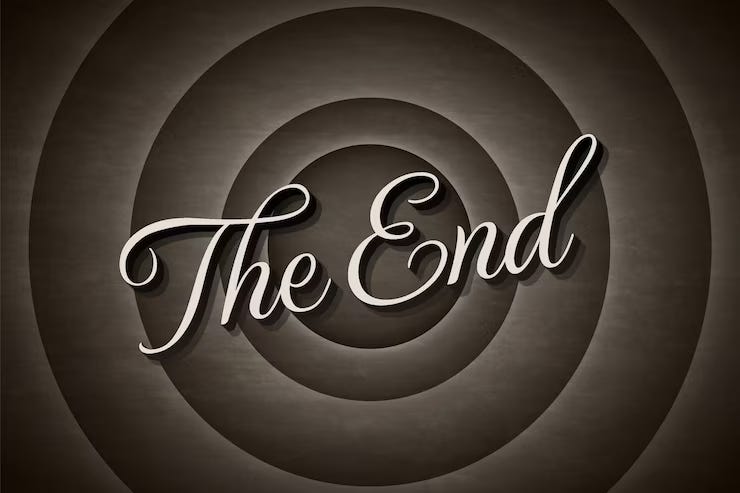I’m taking a small departure this week to muse on the craft of writing, and specifically the writing of endings. Endings have always been a problem for me. My talent lies in the intro, an attribute that serves me well in newspapers where nobody reads much beyond the headline. Outros present more of a challenge, something that I’ve put down to a broader personality trait: I don’t like goodbyes. Drawn out farewells are awkward - I’d rather just cut and run. In my twenties I was notorious among friends for doing the French exit from clubs and parties, slipping out and heading home to bed when exhaustion hit rather than doing the round of drunken goodbyes (sorry, friends). My struggle with outros is the literary expression of this regrettable part of my psyche.
But endings are crucial in long-form and book writing, where your reader is (hopefully) invested in what you’ve written and wants to see it out to the finale. There, you really should have saved the best for last. Presenting a deflating wrap-up is an insult, both to your readers’ time and to your talents as a writer. The cop out solution is to end on a quote - but unless it’s an exceptional quote, one that both sums up and outshines the rest of your prose, this will just not do (and what kind of writer wants their words to be outshone by someone else’s anyway?) A mea culpa here: I am often guilty of this cop out when I am on deadline. But a good outro should be your own words, expressing a distillation of all you have learned and analysed in the writing of your piece and leaving your reader both satisfied and wanting to hear more from you. A terrible ending makes them glad that you have left (probably how my friends felt about me in my twenties).
This, I believe, is also the reason why AI just cannot produce satisfactory prose, whatever its evangelists may insist - and that’s before we even get to the accuracy and plagiarism issues. A great ending comes from deep thinking, which can only come from researching and writing everything the old school way, formulating and modifying your thoughts as you go, and arguing out your ideas with yourself. Asking a machine for short cuts inevitably leads to holes in your reasoning, and when you finish your piece and hold it up to the light, that’s when those holes will show. AI scrapes data and processes it, then spits it out in the form its programming has identified as most palatable. Writers - real flesh-and-blood writers - bring empathy, experience, prejudices, flaws, wit and messy, imperfect, human thinking to their data, and that is what gives their work warmth and viv. The very act of writing is as important as the finished product, and until AI can replicate that, I’ll pass. I’m not even sure it ever will - it’s like comparing the sound quality of vinyl to MP3. I challenge you to find an AI-written piece with a killer outro.
Endings are hard because they should be. Very occasionally, I’ll know exactly what I’m going to say before I start writing, and I will write my outro first and then feel extremely accomplished as I go back to the top to write the rest. More often, I craft an intro that I love (and that’s just as important, because a great intro sets your writing up to flow). But, like a Turkish infrastructure project, my full-steam-ahead start generally fizzles and then I spend as long trying to write the last paragraph as I have on the rest of the piece. The only real solution is time: the time to step away from what you have written, forget about it, and come back with fresh eyes and brain, and ideally the input of an editor. Having just finished the first manuscript for my new book, Hinterlands, this is the stage I’m now at. I know that my current ending is terrible, and I am resisting the urge to look at what I’ve written again until I get the editor’s notes back. If I return to it now, my own neuroses will prevent me from improving it. But with the benefit of a couple of months’ distance, I know I will find how to articulate in a few paragraphs everything that I’ve spent 90,000 words explaining.
That’s one of the main reasons I write books: because they allow the space, physically and psychologically, to develop ideas and writing styles, ponder them, refine them, and sometimes rip them up and start again. Newspapers and scheduled Substack dispatches, on the other hand, wait for no man. So apologies for this subpar outro, the latest in a very long line I have produced in the course of my writing career - but at least I’m not ending on a quote.



Love this. Guilty as charged about often ending on a quote, but in journalism I justify it as giving the last word to one of the subjects rather than myself :D